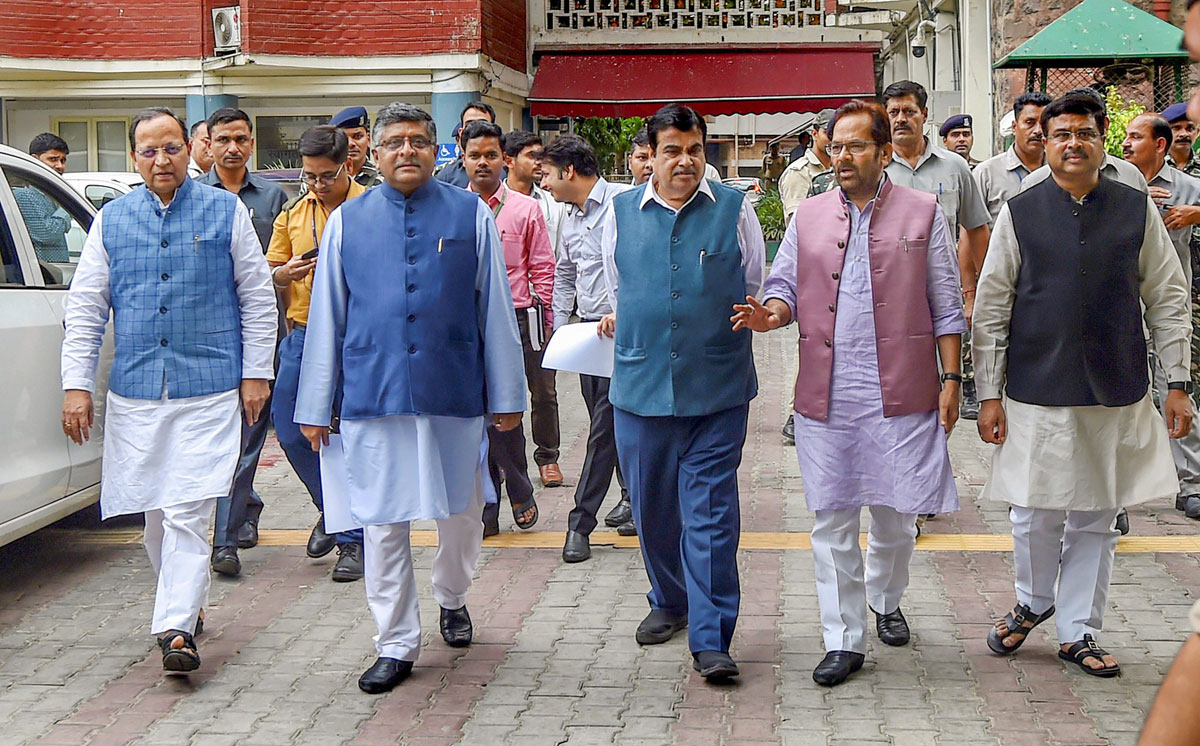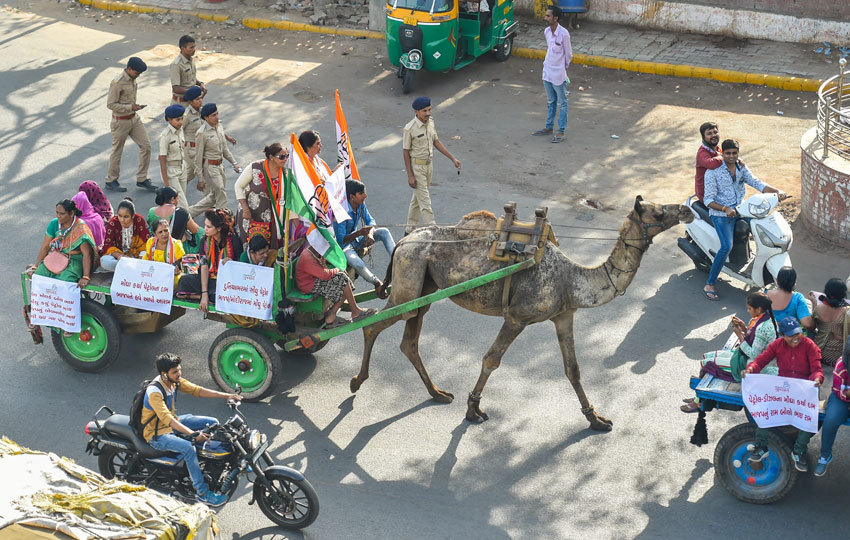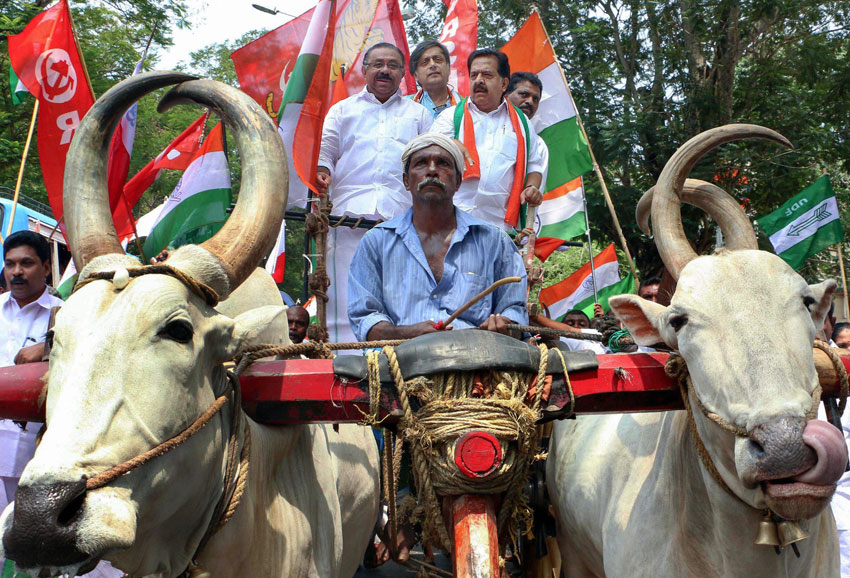Fuel Prices Skyrocket in India
Congress leader Shashi Tharoor flanked by KPCC president M.M. Hassan (l) and opposition leader Ramesh Chennithala ride on a bullock-cart during a rally to protest against the hike in prices of gasoline and diesel, in Thiruvananthapuram, May 2. (Press Trust of India)
Global crude oil prices have been rising over the recent months, spiking further due to escalating trade tensions between China and the U.S. Brent crude oil has been quoting over $70 per barrel. Fuel prices in India, that imports over 80% of its crude oil needs, have spiraled to multi-year highs as a consequence. In New Delhi, petrol prices touched a five-year high of nearly Rs. 74 recently. Petrol (Gasoline) was selling at similar rates in Delhi back in September 2013, writes Siddharth Srivastava.
A similar story is unfolding in other metro cities such as Mumbai, Kolkata and Chennai. Diesel prices have also scaled to record levels quoting between Rs. 65-70 across the country. Diesel at Rs. 64.7 currently is the highest ever in the national capital.
On an average petrol and diesel prices have risen Rs. 10.7 and Rs. 11.4 per liter, respectively, in the last nine months, during which crude oil has gained from under $22 per barrel to about $70 per barrel, as per official data released by petroleum planning and analysis cell (PPAC), last week. The basket of crude oil that India imports averaged $55.74 per barrel in the April-February period, 2017-18, as compared to $47.6 a barrel in 2016-17 and $46.2 in 2015-16.
India’s oil import bill, meanwhile, was $88 billion in 2017-18, up from $70 billion in 2016-17. The import bill will increase 20% to $105 billion in this financial year, the oil ministry has estimated.

Burden of Tax
The finance ministry has ruled out any cut in excise duties for now to cushion the rising prices of fuel. Heavy duties imposed by the center and states is one big reason that petrol and diesel prices are among the highest in the world, in India.
In Delhi, petrol is slapped about 100% and diesel 69% levies comprising excise duty and VAT, PPAC has said. New Delhi has raised excise duty nine times between November 2014 and January 2016 as global oil prices fell, but cut the tax just once in October last year. This helped government double the excise mop up in 2016-17 compared to 2014-15. In this context, minister of oil and natural gas Dharmendra Pradhan said recently that inclusion of petrol and diesel in the newly rolled out Goods and Services Tax (GST) framework will help consumers pay a rational price for fuels.
Petrol, diesel, natural gas, crude oil and jet fuel are currently not included in GST. The highest rate of tax on products under GST is 28%, much less than the prevailing duties on fuel.
“For consumers to get rational price mechanism, the petroleum products will have to be brought into the GST mechanism,” Pradhan said. In a submission last month, the Bangalore Chamber of Industry and Commerce (BCIC) has also sought the intervention of GST Council.
In the two-month span, petroleum prices have increased by Rs. 15 per liter in Bangalore, the chamber said. “GST Council in its forthcoming meeting scheduled for second week of April, should bring petroleum products under the ambit of GST. This is the only way out to offset the increase in prices of petrol and diesel,” BCIC said. This, however, is easier said than done as tax on fuel sales is a major source of revenue for both center and states.

Free Market Pricing
New Delhi has clarified that it will stick to free market pricing of both diesel and petrol. “There can be no knee-jerk reaction on economic policies. India needs market pricing to provide oil to all. Fuel pricing is based on a transparent mechanism. When crude oil prices rise, naturally consumer feels a pinch,” Pradhan said last month.
Open pricing is important for financial stability of both private and state-owned fuel retailers Indian Oil Corporation (IOC), Bharat Petroleum Corporation (BPCL) and Hindustan Petroleum Corporation (HPCL) that currently revise prices daily to reflect change in costs. Sale of fuel below market price will result in massive under-recoveries that will need to be subsidized by the government, that is an inflationary process due to negative impact on the fiscal deficit. Cross-subsidy by state entities such as ONGC, OIL and GAIL also drains their capex abilities. Reliance Industries and Essar Oil, that have rolled out big pump expansion plans, will also be priced out of the market.
In Conclusion
With general elections scheduled next summer, New Delhi should resist temptation to cap fuel prices by bowing to populist sentiments. At the same time, a combination of high oil prices and taxes does seem harsh on the buyer. A sharp cut under the GST framework many not be immediately possible as it could lead to an unreasonable rise in fuel demand that can skew India’s trade balance. New Delhi, however, could look to ease the burden of excessively high prices by working out a balance that marries fiscal needs and protects consumer interests.


